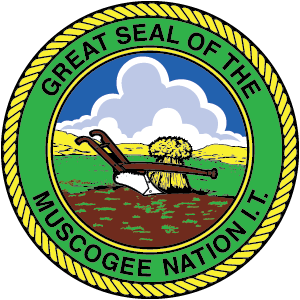Muscogee (Creek) citizens host Trail of Tears Commemoration
Amanda Rutland/MCNPR
MT. JULIET, Tenn. — Natives and non-Natives alike gathered for the 15th Annual Trail of Tears Commemorative Walk to mark the 180-year memorial. The event took place over two days in Mt. Juliet and Woodbury, Tennessee.
Event coordinator and Muscogee (Creek) citizens Melba Checote-Eads said the event has a dual purpose to educate and to heal, but it also honors all tribes that have been displaced from the southeast.
“When we walk and when we talk about these Trail of Tears stories, we want to bring up all of our people that were forcibly removed from their homeland,” Checote-Eads said.
The commemorative walk traces the 800 mile Northern Route of the Trail of Tears, which was taken by 10,000 Cherokees and approximately 500 Muscogees.
The event brings awareness to the intense hardships suffered by the southeastern tribes on the trail. There are no federal or state recognized tribes that reside in Tennessee. Muscogee (Creek) citizen and Tennessee resident Cindy Yahola said that people in the area believe all the tribes died out.
Checote-Eads said the event started as the vision of a fellow church member.
“It was a vision of a little man at the church there, Cooks United Methodist Church. He was from Oklahoma, but he was non-Indian,” Checote-Eads said. “He said, ‘When I keep seeing this Trail of Tears sign, I want us to do something about it. I want our church to do something about it.’ ”

Muscogee (Creek) ministry team Betty Samuels and her husband, Rev. Ray Samuels made the trip from Oklahoma to Tennessee, to be part of the event something they have done together for the past 15 years. They contribute Muscogee hymns and prayers to the commemorative walk.
Checote-Eads is grateful that Muscogee people are coming back to the Homelands.
“Healing and reconciliation and restoration is really those big things that we need to do,” Checote-Eads said. “It really touched me that they and our people needed to heal. They had gone on living, raising families and singing our hymns, being the people that we are, but we did not touch the idea of the Trail.”
This year’s observance included the Native Praise Choir from Oklahoma. The Native Praise Choir is a ministry of the Native American Link.
Native American Link Director and Muscogee (Creek) citizen Augusta Smith said walking the trail and being part of the commemoration was a heart wrenching experience.
“I think the greatest pain that I feel is recognizing that our people were not respected. They were not honored and they were not valued. That is the part that is hardest to accept, but also recognizing that we need to move on,” Smith said.
Smith echoed the same sentiment as Checote-Eads.
“We live today as a result of the experience they endured and they experienced much death, much sorrow, much grief, but yet they kept going. That speaks to the perseverance of our people.”




